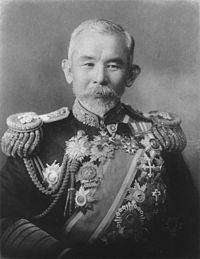Ijuin Gorō
|
Baron Ijūin Gorō |
|
|---|---|

Japanese Admiral Baron Ijūin Gorō
|
|
| Native name | 伊集院 五郎 |
| Born |
September 29, 1852 Kagoshima, Satsuma domain, Japan |
| Died | January 13, 1921 (aged 68) Tokyo, Japan |
| Allegiance | Empire of Japan |
| Service/branch | Imperial Japanese Navy |
| Years of service | 1871-1917 |
| Rank | Marshal Admiral |
| Unit |
|
| Battles/wars | |
| Awards | Order of the Golden Kite (1st class) |
Marshal Admiral Baron Ijūin Gorō (伊集院 五郎?, 29 September 1852 – 13 January 1921) was a Meiji-period career officer in the Imperial Japanese Navy.
Born in what is now part of Kagoshima city, as the son of a samurai retainer of Satsuma domain, he fought as a Satsuma samurai and foot soldier during major actions in the Boshin War (1868) against the forces loyal to the Tokugawa Shogunate.
After the Meiji Restoration and the establishment of the new Meiji government, Ijūin moved to Tokyo and entered the 4th class of the Imperial Japanese Naval Academy (1871), and as cadet served on vessels of the early Imperial Japanese Navy. He participated in the Taiwan Expedition (1874), the Ganghwa Island incident off Korea (1875), and the Satsuma Rebellion (1877).
Sent to England for study in 1877, Ijūin completed courses at Royal Naval College, Greenwich and was commissioned a sub-lieutenant on 27 November 1883. Promoted to lieutenant on 20 June 1885, he returned to work on the Imperial Japanese Navy General Staff (1886–99). He was promoted to lieutenant-commander on 16 October 1890 and received a double promotion to captain on 7 December 1894. During the First Sino-Japanese War he served as a staff officer at the Imperial Japanese Navy headquarters. He became a close confidant of navy chief Admiral Yamamoto Gonnohyoe, and was an important planner and specialist in naval technology.
...
Wikipedia
